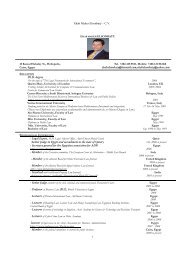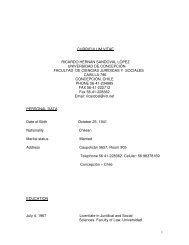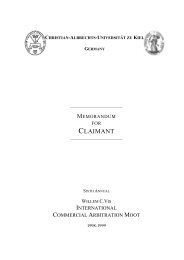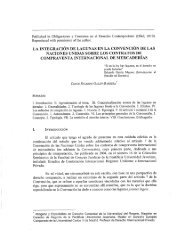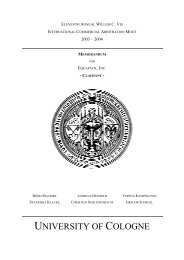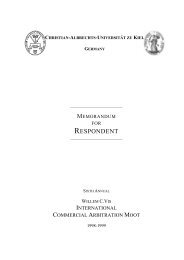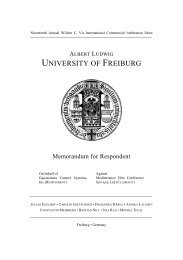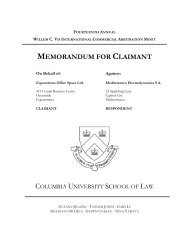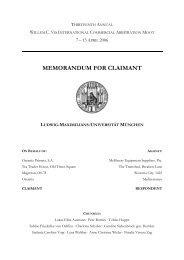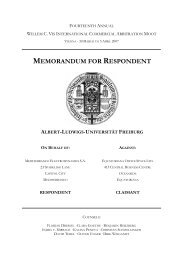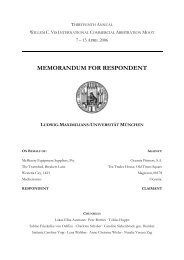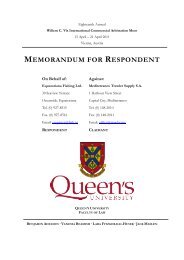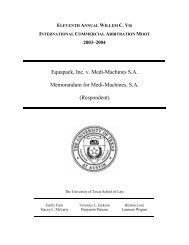MEMORANDUM FOR RESPONDENT - CISG Database
MEMORANDUM FOR RESPONDENT - CISG Database
MEMORANDUM FOR RESPONDENT - CISG Database
You also want an ePaper? Increase the reach of your titles
YUMPU automatically turns print PDFs into web optimized ePapers that Google loves.
Commercial Contracts (“UNIDROIT Principles”) and also incorporated in the lex mercatoria<br />
[Sykes, p. 66].<br />
21. Article 4.6 of the UNIDROIT Principles, which is an encapsulation of the contra<br />
proferentem rule, states: “If contract terms supplied by one party are unclear, an<br />
interpretation against that party is preferred”. The contra proferentem rule may thus play a<br />
supportive role in discovering the parties’ intent to arbitrate by granting a presumption in<br />
favour of what the non-drafter prefers [Sykes, p. 74]. It provides a more favourable<br />
interpretation to a non-drafter claiming that a drafter cannot rely on an ambiguous arbitration<br />
clause, and that there is consequently no agreement to arbitrate [Sykes, p. 76].<br />
22. In the present case, the Claimant had rejected an arbitration clause prepared by the<br />
Respondent which provided for arbitration at the Mediterraneo International Arbitral Center<br />
(“MIAC”), and had inserted the present arbitration agreement which has deliberately deleted<br />
the reference to an arbitral institution [Answer, para. 5; Respondent’s Exhibit No. 1].<br />
Pursuant to the contra proferentem rule, this Tribunal should presume that, had the Claimant<br />
intended for institutional arbitration under the CICA, it would have cared to insert the name<br />
of the CICA, even if in an erroneous approximation, and not to leave the reference<br />
ambiguously as “International Arbitration Rules used in Bucharest”. If the Claimant had<br />
intended a different meaning, they should have clarified this with the Respondent when Mr.<br />
Stiles asked Mr. Konkler why a different arbitration clause was inserted [Respondent’s<br />
Exhibit No. 1]. This Tribunal would unjustly reward the Claimant’s careless drafting and<br />
infringe the contra proferentem doctrine if it were to find in favour of institutional arbitration.<br />
23. On the other hand, the surrounding facts and circumstances support the conclusion<br />
that the Respondent did not intend for institutional arbitration under the CICA. The<br />
arbitration clause initially contemplated by the Respondent explicitly names the arbitral<br />
institution, the MIAC [Answer, para. 5]. When the Claimant deleted the reference to the<br />
MIAC and failed to name another arbitral institution, it was reasonable for the Respondent to<br />
interpret the reference to “International Arbitration Rules used in Bucharest” to provide for<br />
ad hoc arbitration. Thus, Mr. Stiles noted that the removal of an arbitral institution made the<br />
arbitration agreement look strange because “no institution was mentioned” [Respondent’s<br />
Exhibit No. 1].<br />
9



